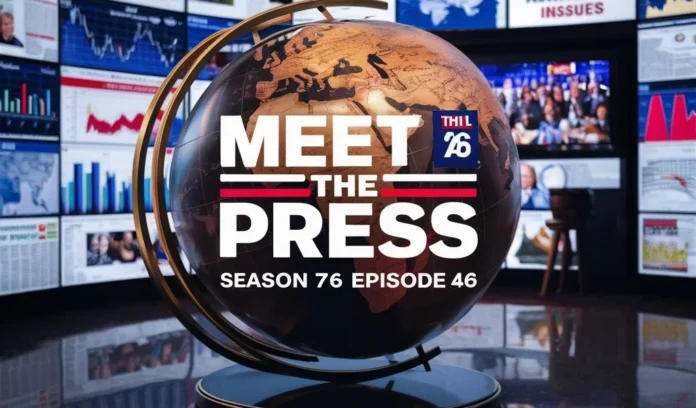In the ever-evolving landscape of American politics, few platforms have wielded as much influence as NBC’s “Meet the Press.” As a cornerstone of political discourse for over seven decades, this iconic program has examined pressing issues and shaped public opinion with its thought-provoking interviews and insightful analysis. In Season 76, Episode 46, something remarkable unfolded—an episode that not only captivated viewers but also sparked intense conversations across party lines. Join us as we delve into the profound impact of this particular episode on political dialogue in America, exploring how it challenged narratives, ignited debates, and perhaps even redefined what it means to engage in civil discourse today. Whether you’re a seasoned political junkie or just curious about the currents shaping our nation’s conversation, you won’t want to miss this exploration!
Introduction to Meet the Press S76E46
Meet the Press has long been a cornerstone of political journalism in America, shaping how audiences engage with current events. In its 76th season, episode 46 (S76E46) presented an insightful dialogue that captivated viewers across the nation. With a blend of expert analysis and candid interviews, the episode sparked conversations that went beyond the screen.
As we dive into this particular installment, it’s essential to understand not just what was discussed but also why it matters in today’s political landscape. The show’s influence reaches far and wide, impacting opinions and informing voters at every turn. Join us as we explore how Meet the Press S76E46 continues to resonate within the realm of American politics and shapes discourse for years to come.
History and significance of Meet the Press
Since its inception in 1947, Meet the Press has stood as a pillar of American journalism. Created by journalist Martha Rountree, it was the first television program dedicated solely to political interviews and discussions.
This groundbreaking format set the stage for future news programs. It introduced audiences to direct dialogue with politicians and key figures, fostering an informed citizenry.
As a Sunday morning staple, Meet the Press has shaped public perceptions of government officials and their policies. Its impact extends beyond mere reporting; it encourages accountability in leadership.
Throughout its history, notable figures like Tim Russert have graced the host seat, leaving lasting impressions on both viewers and participants alike. The show’s blend of probing questions and candid responses continues to resonate deeply within America’s political landscape.
The format and structure of the show
Meet the Press follows a distinctive format that keeps viewers engaged while delivering critical political insights. Each episode typically features interviews with prominent figures, including politicians and analysts. This direct approach allows for in-depth discussions on pressing issues.
The show often opens with a roundtable discussion, setting the tone for what’s to come. It brings together journalists and experts to dissect current events, offering diverse perspectives.
Following this segment, host Chuck Todd guides poignant one-on-one interviews. These conversations dive deep into topics shaping public discourse, allowing guests to articulate their viewpoints unfiltered.
Visual elements play an essential role too. Clips from ongoing news stories provide context and enhance viewer understanding of complex subjects. The structured yet dynamic format makes it not just informative but also highly engaging for audiences following political developments closely.
Role of Meet the Press in shaping political discourse in America
meet the press s76e46 has been a cornerstone of American political discourse since its inception. For decades, it has provided a platform for politicians, policymakers, and experts to discuss pressing issues.
The show’s ability to bring together diverse viewpoints fosters informed conversations that are vital in a democratic society. By featuring prominent guests from across the political spectrum, Meet the Press encourages viewers to engage with multiple perspectives.
Its format allows for deep dives into topics that matter most to citizens. This commitment to thorough analysis helps shape public opinion and informs voters.
Moreover, Meet the Press holds leaders accountable by asking tough questions. This critical role supports transparency in government and reinforces the importance of media as a watchdog.
Through its history, this program has influenced not only how politics is discussed but also how stories are reported across various platforms.
Analysis of a specific episode (S76E46) and its impact on current events
Episode meet the press s76e46 of Meet the Press offered a compelling examination of today’s political landscape. The guests included influential figures who provided unique insights into pressing issues.
One highlight was the discussion on voter rights, which is especially relevant in light of recent legislative changes across several states. This topic resonated with viewers and sparked conversations online, reflecting widespread concerns about access to the ballot box.
Another significant moment came from a deep dive into foreign policy challenges facing America. The perspectives shared illuminated how domestic decisions affect international relations, encouraging audience members to think critically about their implications.
The episode’s tone balanced seriousness with hope, making it accessible yet thought-provoking. Such discussions are crucial as they engage citizens in vital dialogues that shape public opinion and ultimately influence policy decisions moving forward.
Controversies surrounding Meet the Press
Meet the Press has often found itself at the center of controversies. Critics argue that its host selection sometimes reflects a biased political agenda, influencing viewer perceptions.
The show’s choice of guests can stir debate as well. Some feel that certain viewpoints are underrepresented, which raises questions about fairness and balance in political discourse.
Additionally, moments during live broadcasts have sparked heated discussions. Incidents involving challenging questions or heated exchanges between guests can lead to public outcry.
Social media amplifies these controversies, with audiences quick to express their opinions online. The platform becomes a battleground for supporters and detractors alike.
Despite the backlash, Meet the Press continues to be an influential player in shaping narratives within American politics. It navigates these challenges while striving to maintain credibility in an ever-evolving media landscape.
Criticisms and praise for the show
meet the press s76e46 has garnered a mix of both criticisms and praise throughout its long history. Supporters often highlight its commitment to journalistic integrity, asserting that it provides a platform for diverse voices in political discourse. The show’s ability to adapt to changing political landscapes is seen as a testament to its relevance.
On the flip side, some critics argue that Meet the Press occasionally leans toward sensationalism. They believe certain interviews prioritize entertainment over substance, potentially overshadowing critical issues.
Another recurring critique involves perceived bias in guest selection. Detractors claim this can skew conversations and limit viewpoints presented on air.
Despite these concerns, many viewers appreciate the show for fostering informed discussions among policymakers and experts alike. This duality of perception showcases how deeply influential Meet the Press remains within American media culture while provoking necessary debates about journalism standards today.
Influence on media and journalism standards
Meet the Press has been a beacon for media standards since its inception. The show’s commitment to rigorous fact-checking and high journalistic ethics sets a benchmark in political reporting.
Its influence extends beyond just content. It shapes how other programs approach interviews, emphasizing accountability among public figures. This pressure pushes journalists to dig deeper, ensuring that viewers receive well-rounded perspectives.
Moreover, Meet the Press showcases diverse viewpoints by inviting guests from various political backgrounds. This practice encourages open dialogue and fosters understanding across the aisle.
The show’s format—balancing hard-hitting questions with thoughtful discussion—has become a template for many news outlets. As it continues to evolve, it remains an essential part of America’s media landscape, inspiring new generations of journalists committed to integrity and transparency in their work.
Future prospects for Meet the Press
The future of meet the press s76e46 looks intriguing as it adapts to an ever-evolving media landscape. With audiences increasingly turning to digital platforms, the show has opportunities to expand its reach through social media and streaming services.
Engaging younger viewers will be crucial. Incorporating fresh perspectives and diverse voices can help capture a broader audience. By embracing innovative formats, such as live discussions or interactive segments, the program can maintain its relevance.
Moreover, addressing pressing issues like climate change and social justice could position Meet the Press at the forefront of meaningful dialogue. As political dynamics shift, staying adaptable will be key in navigating these changes.
Partnerships with emerging journalists might also infuse new energy into traditional reporting styles. The show’s legacy hinges on striking a balance between honoring its history while pioneering new paths for political discourse in America.
Conclusion:
The enduring legacy of Meet the Press and its impact on American politics.
The legacy of meet the press s76e46 is deeply woven into the fabric of American political discourse. Since its inception, the show has served as a cornerstone for political journalism, setting standards that have influenced countless other programs.
As we analyze like meet the press s76e46, it becomes clear how impactful discussions on this platform can be. The way issues are framed and addressed resonates with audiences far beyond the studio walls. Each episode not only reflects current events but also shapes public opinion and policy discussions.
Meet the Press continues to draw attention from both critics and supporters alike. It stands at a unique crossroads where tradition meets modernity in an ever-evolving media landscape. This discussion creates ripples throughout society, fostering dialogue among viewers.
The program’s ability to adapt over time while maintaining its core mission highlights its significance in contemporary politics. As new generations engage with news differently than before, Meet the Press remains committed to delivering insightful commentary on pressing issues.
Ultimately, shows like Meet the Press underline their importance by encouraging critical thinking about our leaders and policies — something that will always resonate within American democracy.


